In Space, Star Treks You: Is Gene Roddenberry's Vision For The Future Communist?
Gene Roddenberry dreamed of a better world when he created Star Trek: A utopian society with no need for money, where war and disease were distant memories.
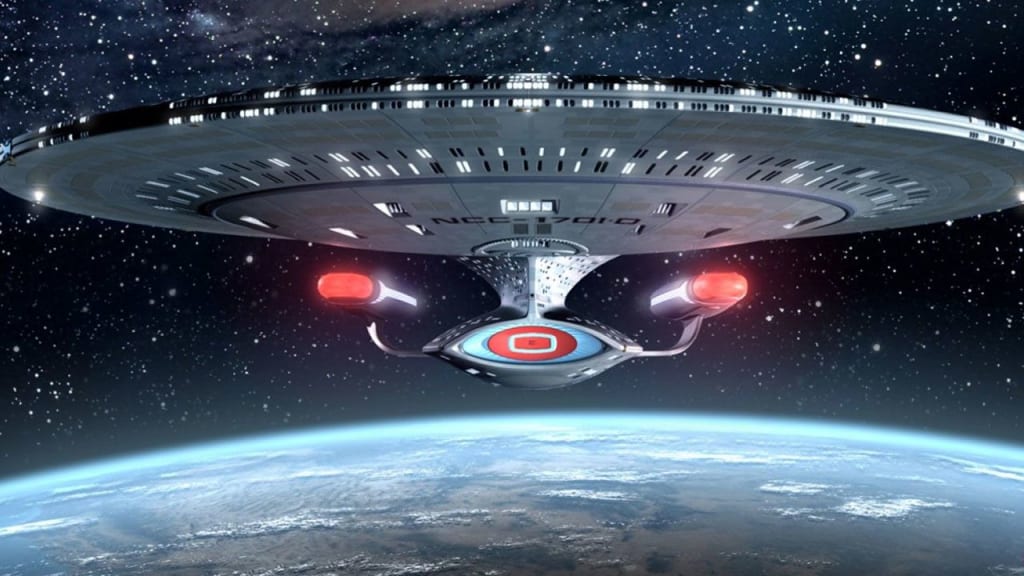
#GeneRoddenberry dreamed of a better world when he created Star Trek: A utopian society with no need for money, where war and disease were distant memories. Where humanity had long reconciled its dysfunctions and prejudiced ways, and Star Trek: The Original Series broke ground with a history-making diverse cast, and a message of hope.
When Star Trek premiered in 1966, a time of social upheaval accompanying the Vietnam War, this was something American audiences sorely needed to see on #TV. It did what some of our most powerful and important #scifi stories are supposed to: it told a scared and discouraged generation that their struggles and suffering weren't in vain, and gave them hope for a brighter tomorrow. Star Trek still gives us hope today, and that's one reason it continues to resonate so strongly. Its message is timeless. We'll probably always need it around.
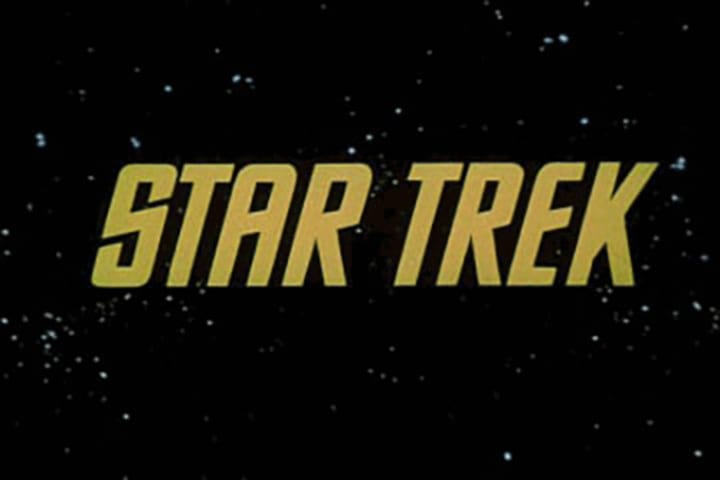
It has been - and always shall be - our friend.
From the start, conservative critics have argued Star Trek is "communist."
But from the very beginning, conservative critics eyed it with suspicion, calling it "communist" - a dangerous accusation at the time. Especially with audiences smack in the middle of the Cold War tuning in every week to see a Russian guy right on the bridge — which was kind of Roddenberry's point: "In the future, we'll be friends." But even if the majority of each show's main cast wore military uniforms, a huge part of every #StarTrek series' major theme is the victory of rugged American-style individualism over conformity - and assimilation. Personal expression is celebrated, within Starfleet regulations, and resistance is never futile.
Across the board, the bad guys certainly symbolize some of America's deeply-ingrained worst fears of the loss of individual freedoms... though this specific threat seems more reminiscent of fascist armies.
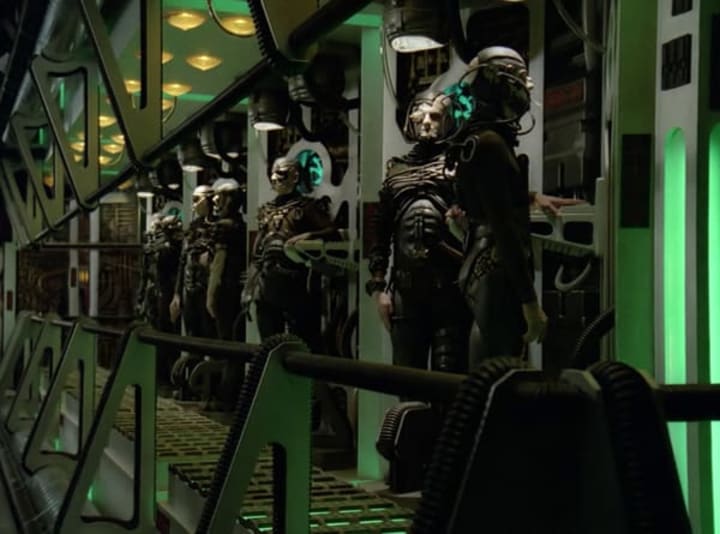
Got Borg? We will soon.
So does that cancel out the communist claims? What do we even call a show where "finding what makes us individuals" is the million-dollar question, but humanity doesn't use dollars anymore? Does it promote any ideology at all - or is there even a need to classify it?\
Roddenberry's whole 'imagine there's no money, no war' vision still seems pretty communist when you compare it to our western world. "Socialism" might hit closer to the mark, when you consider Starfleet’s prized individuality blended with group cooperation. But we're not alone in the galaxy, and this isn't just a show about the Federation. And what happens in extreme situations, when we're forced to put that Federation utopia aside, and work together for the group's survival? Like when Voyager found itself stranded 75 lightyears from home. Sometimes the rules have to change.
If it sounds like there's more than one answer here… Yeah. There are about as many ways of looking at this as there are TV series. Or Captains. Kirk or Picard? #StarTrekVoyager or #StarTrekDeepSpaceNine?
Like in all good stories and good Star Trek, the answer is complex. And it's mostly left up to us - and our individual choice.
They are Borg. We’ll probably be assimilated. Resistance is… you know.
The Borg are a nightmare. Often literally. I think most fans have had the scary 'oh no, please don't let them assimilate me' dreams at one point or another.
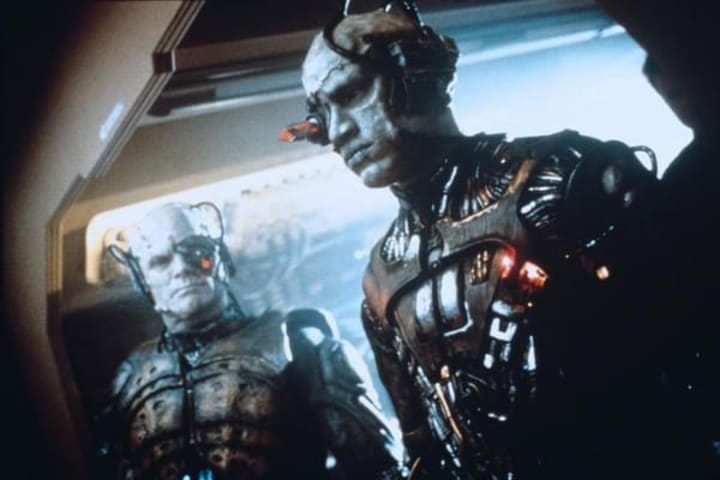
Hello, Nightmare #493
And they're a pretty strong argument for the "Star Trek is communist" claim, because what do most American viewers associate with communism, even if the connotation isn't entirely accurate? Probably something pretty Borg-like. And they are definitely a force to be reckoned with, and feared.
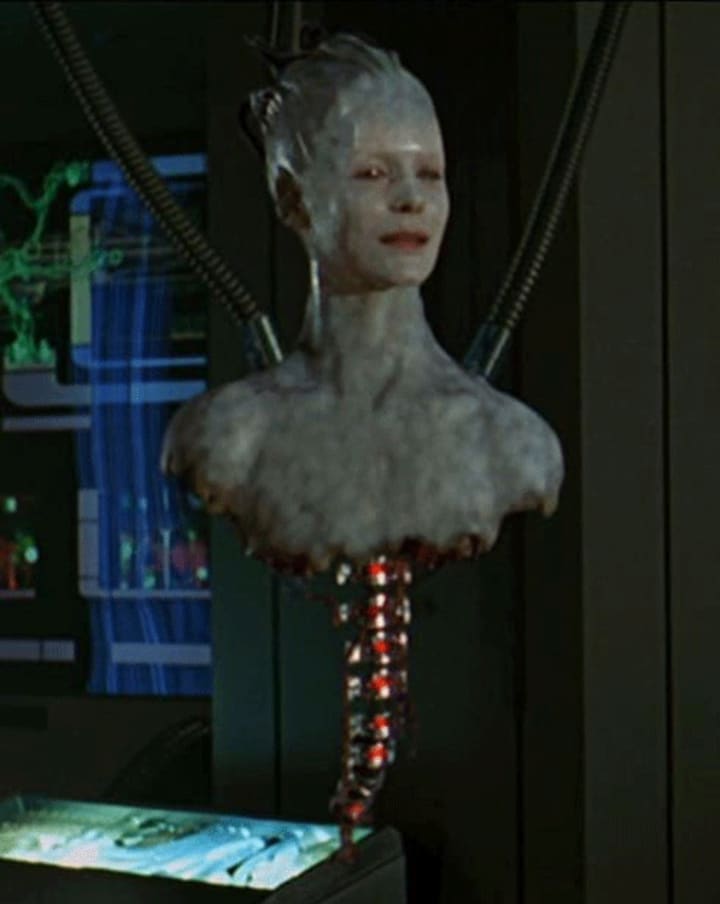
Seriously, oh my gosh. No. Nope. Done.
They're like an overpowering force of nature or an unstoppable plague. They don't give a single stem bolt about how rich you are, they'll assimilate everyone just the same. Borg personify a complete erasure of personal identity, an assimilation into a greater (and scarier) whole. Total adherence to the hive-like Collective and its all-powerful Queen, sacrifice of individual thought and free will. (More fascist when you consider that the only individual left is the Queen, whose every wish is her drones' command.) And then there's that creepy BDSM cyborg-insect thing they got going on. They're some of the most terrifying villains in Star Trek, and among the most iconic in pop culture.
But every Borg drone selflessly serving Collective and Queen was once an individual person, just like you and me. And with a little help from their friends, they can be again.
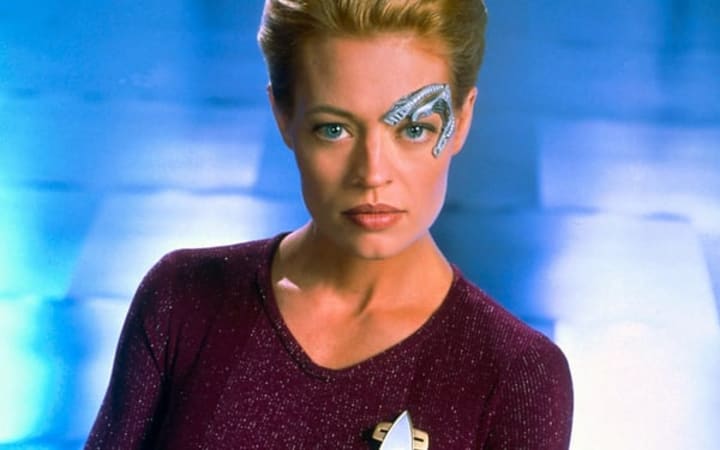
Seven of Nine, Tertiary Adjunct of Unimatrix Zero-One. 'Seven' is also fine.
Take Seven of Nine. Out of every character's Star Trek evolution, hers has the most emphasis on finding her own personal identity. It was taken from her a long time ago. When she was a child, she and her parents were abducted by the Borg and forcibly injected with alien technology, stripped of all individual thought or personal control. But she had a family once, and parents. She had a name instead of a designation number. It was Annika. Her favorite color was red. She wanted to be a ballerina.
All of that was lost, along with her parents, her memories, and entire life until that point. Seven spends part of the show mourning that loss, and the rest adjusting to a new, unfamiliar and sometimes challenging life among people who are forced to work together to survive.
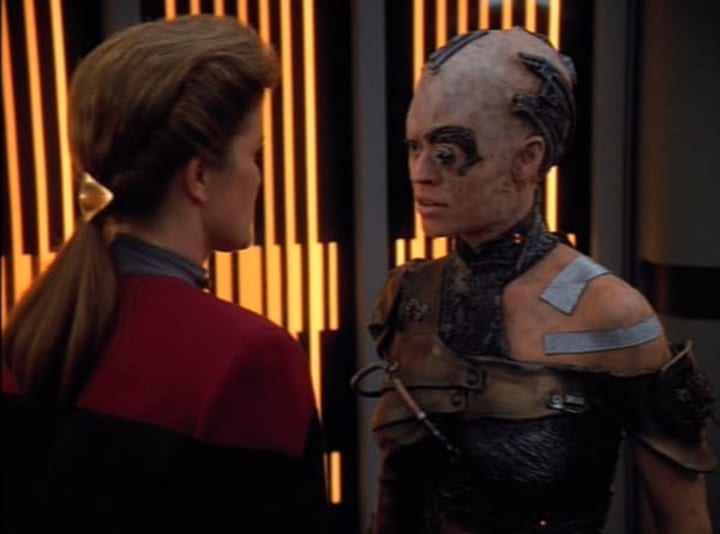
She'll get better.
Seven never goes by "Annika" again. (Except for that one time, in that alternate future...) That little girl is long gone. In a way, she died the minute she became a drone - but that doesn't have to be a bad thing. Like anyone who's suffered a life-altering, traumatic event, Seven of Nine is a new person now. Her own person. A unique individual. She may have lost her old life and self, but she's found something just as precious: a new self, and a new life, with a new family. One that shares, trusts, and relies on one another to live. As she puts it, Voyager's crew is her 'new collective.' Except this time, she had a choice in the matter.
#Voyager the series, then, is a unique blend of all the Star Trek series, the one that most dearly prizes the struggle for individuality against conformity also demands that we work together for survival. You might say the most defiantly rebellious Star Trek series is also the most collective. Or communal.
'Voyager': we sink or swim together.
Voyager's goal is simple: get the crew home alive as quickly and safely as possible. Since they're far from home and friends, they have to scrape by with limited resources - which they trade for maps and shortcuts home. They grow their own fruits and vegetables in the airponics bay, which Neelix whips up in the galley to feed an army.
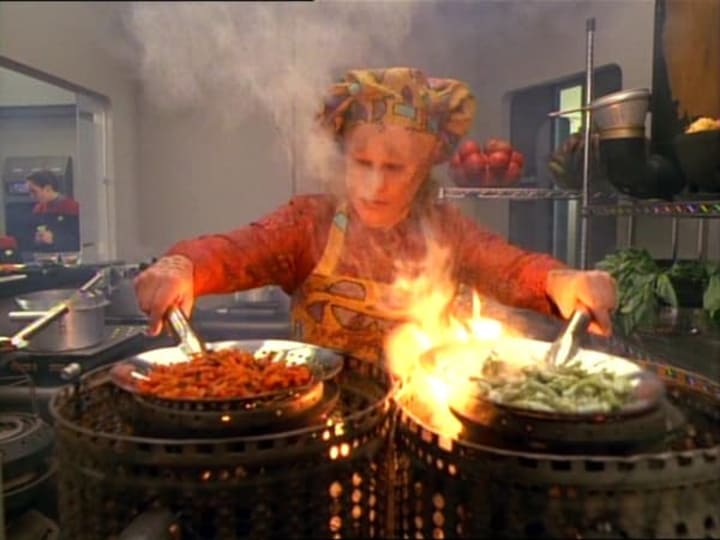
Hope you like leola root stew!
Everybody contributes to the shared space, everyone has a place and purpose on the ship that serves as their home, and works to further their goal of one day reaching Earth. The Delta Quadrant is a dangerous place, and everybody knows that individually, they don't stand a chance. If they ever want to see that big blue marble again, they have to pull together - Starfleet and Maquis, human and alien alike. And they might have started out by gritting their teeth and thinking of Earth, but the Voyager crew is quick to adapt, to coin a Borg phrase.
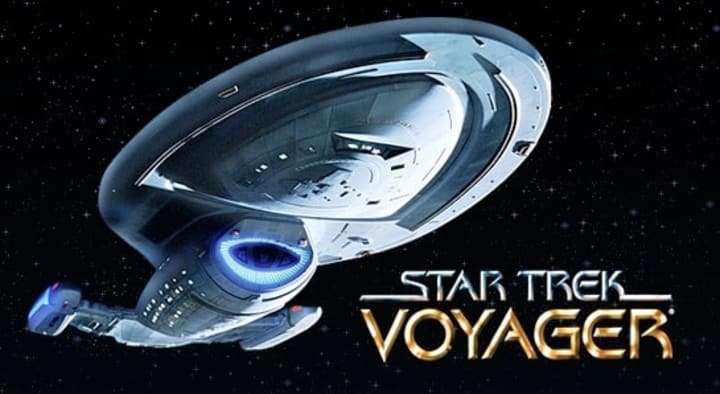
So if we're looking at communism at its barest definitions - a group of people whose efforts and resources are combined and distributed for the safety and survival of the group - that fits pretty well. But everyone still does have their own belongings and quarters, and individual expression is encouraged, so, like the Federation, it seems more socialist-leaning.
However, the Voyager crew also has much less choice here - leave the group and die, essentially, and it's certainly not a democracy. Captain Janeway makes the final, very hard decisions, and it's rare that everyone agrees. (Ask B’ellana or any other former Maquis member how they feel about a command decision sometime.)
Voyager acts as is one cohesive unit because it has to be - initially, anyway. Two very different forces, Starfleet and Maquis, work together to survive. But they do work together. And through that union, they not only survive, but discover and achieve more than either of them could have accomplished on their own.
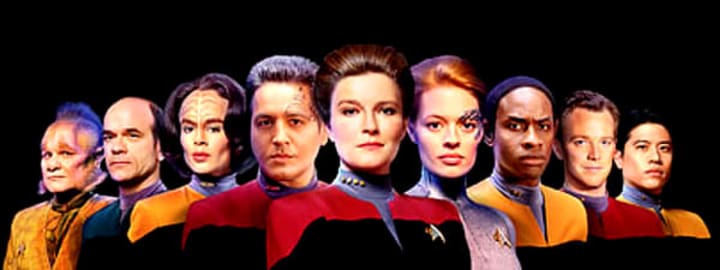
WE TRAVEL THE STARS RIGHTING WRONGS! YEAH!
But how well does Voyager compare to the home it's trying so hard to reach? Is it an outlier, or a shining example of how Federation society is supposed to work? By the 24th century, Earth was still around, but a lot of things had changed. Money was one of the first things to go.
The root of all evil has no place in a good world. Or at least some versions.
Read "moneyless society," and you'd think money would never come up in any Star Trek episode, right? But it's hit or miss. The movies don't really touch it, reboot or original, unless there are some time-travel shenanigans going on and they have to blend in.
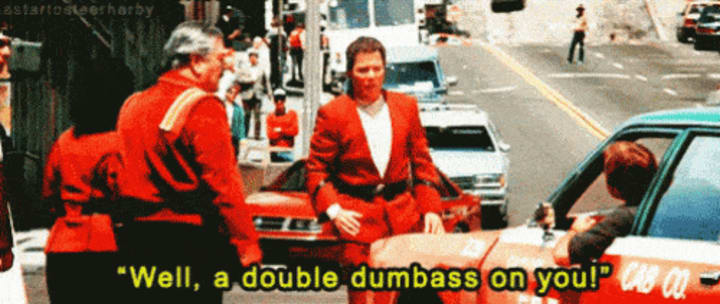
Yes. Blending. We're blending.
#TheOriginalSeries briefly mentioned "credits," but they aren't a major part of daily life. Money gets a few passing nods in #TNG, so we can assume the Federation has at least a technical economy, but it clearly isn't used often, and the average citizen doesn't need it to get by. Otherwise, the galaxy's most common currency seems to be the liquid element Latinum, usually suspended in gold bars. That gets the most emphasis in #DeepSpaceNine, where we see non-Federation characters on a daily basis.
But initially? Nope. Gene Roddenberry's earliest goal in creating Star Trek was to present a utopian society. One where humanity had found a place among the stars, and where all the peoples of the Earth lived in harmony with one another. In the 24th century, we were learning to live in peace with the different peoples of the galaxy, in a United Federation of Planets. There was no disease, no war, no prejudice, no poverty, no suffering. We were beyond that. Better than that. (That's the plan, anyway.)
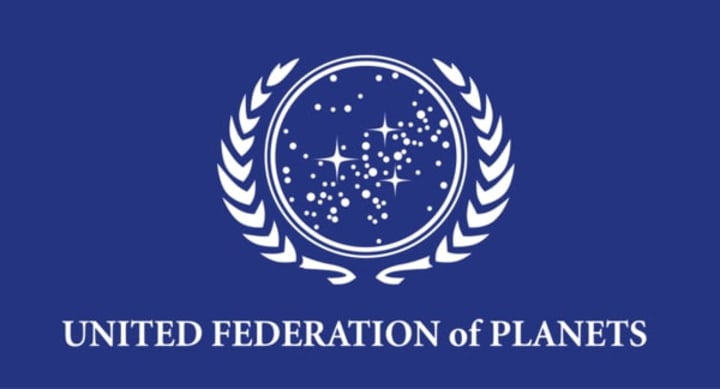
We Are So Freaking Evolved. Look How Evolved We Are. (Until We're Not. There Is No 'Section 31.')
And a huge part of that vision - going hand in hand with the 'no poverty' part - was that if you lived on a Federation planet or colony, you didn't need a dime to your name, because you'd never need to buy a thing in your life. They had replicators to make them enough food to eat instantly. Nobody would ever starve to death again. Nobody would ever die because they couldn't afford life-saving medicine. Nobody would ever be homeless. Everyone would have everything they needed to survive, so they could focus on living. And what beautiful lives they would have. Money didn't have to be a part of them at all.
Everybody works because they want to, and they find it personally fulfilling. The theory here is that if everyone's basic needs are met, they'll find their niche and do their jobs to the best of their ability. From Starfleet's success, and what we've seen of Earth (Captain Benjamin Sisko's dad, Joseph Sisko, has a thriving Creole restaurant in New Orleans, for example), it seems to be a success.
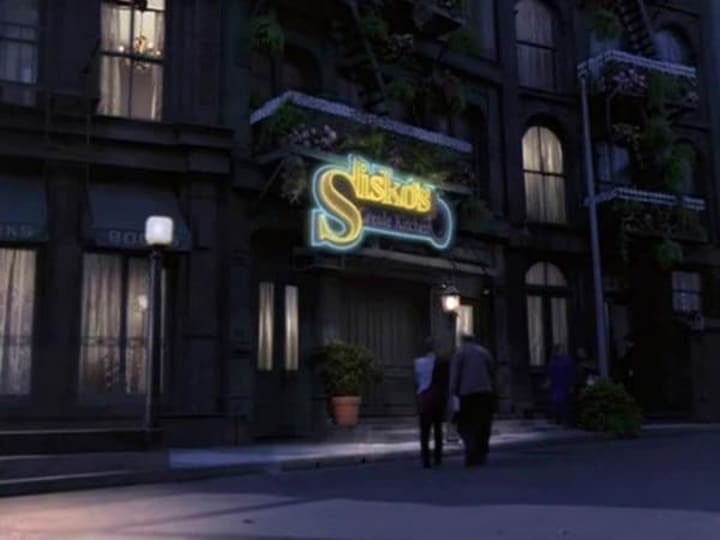
FREE FOOD! I LOVE THE FUTURE! INVENT TIME MACHINES FASTER! NOW!
But money is just one aspect of what makes a society unique. And while each Star Trek series is a unique interpretation of the same universe, we get to see a lot of different cultures within that universe. This galaxy is filled with alien beings whose worlds carry deep and vibrant histories - or serve as terrifying, dystopian-style warnings. Some of them, like the Federation, have abandoned capitalism and commerce entirely, and find they don't really miss it.
The Ferengi are not one of them.
The Ferengi: home is where the heart is, but the stars are made of latinum. (Rule of Acquisition #75)
Ferenginar has a unique (and often dysfunctional) relationship with money. At first glance, they worship it. Literally. The dominant Ferengi society and religion is based around navigating the ebb and flow of the Great Material Continuum or River, in which everybody has something someone else needs or wants, and is willing to pay for. Their philosophy at its wisest says that if you weather its currents with patience and alacrity and bring balance to the flow, the River will provide.
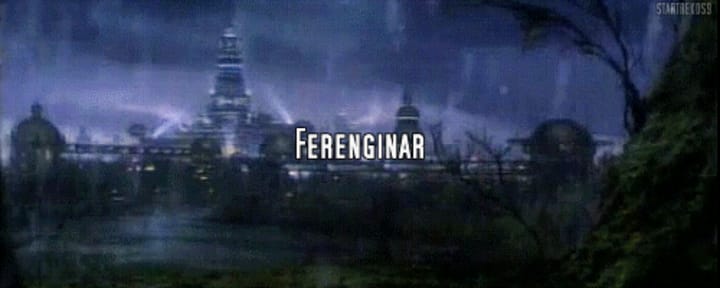
Not surprised they went for a 'river' metaphor. Constant rain. No word for 'crisp' on Ferenginar.
Of course, the River can be treacherous, and the danger comes most of all from your fellow sailors. Winning is everything. Latinum is everything. Lying, cheating, stealing, backstabbing and betrayal are just expected in Ferengi business. Dignity and an empty sack is worth the sack. (Rule of Acquisition #109)
And the consequences for swimming against the establishment’s current are cruel and swift, so you might draw some parallels to hardcore Christianity’s fire and brimstone. Ferengi society is a strict oligarchy (based, as you'd expect, with the rich guys at the top, and the poor guys... nowhere), and the guys at the top are not at all happy when somebody tries to shake things up.
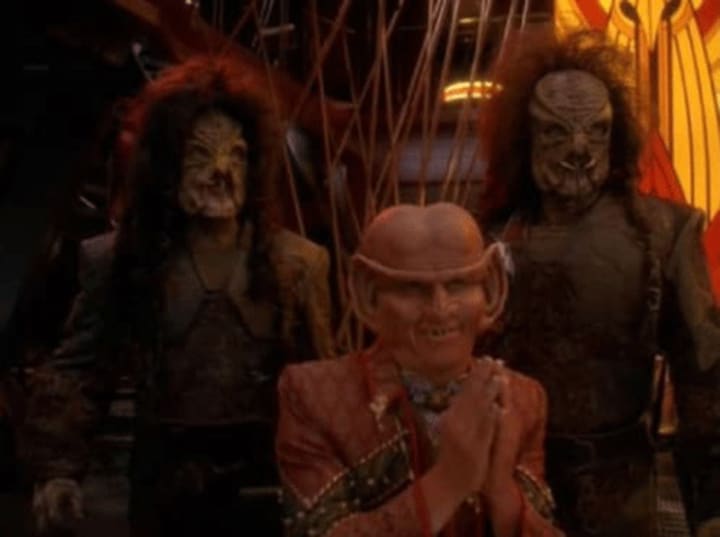
Brunt, FCA. And friends. They're here to ruin your day.
Start a workers’ union? Get tossed off the top of the Spire of Commerce. Break a contract, even if fulfilling it means your death? Get banned from ever doing business with another Ferengi again, basically exile. And that’s just the dudes. Ferengi women aren't even allowed to play the game. Or wear clothes.
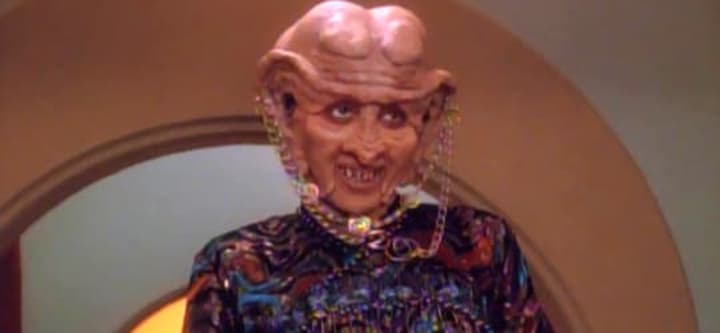
Ishka. Ferenginar's Feminist Rebel Icon. Also, Quark's mom.
If you're a woman and you try to earn profit at all… your life might have sucked before, but now it'll probably be over. Ladies like Ishka, who taught her sons the Rules of Acquisition by which they lead their lives (and the equally brilliant, iron-willed Pel, who we really should've seen more of) don't much care for this, to put it lightly.
As you might have guessed, this system isn't sustainable at all. If Ferenginar wants to have any place in the galaxy, and avoid total self-destruction, it has to change. Fortunately, by the end of the show, they get a great new leader to guide them through social reform - kicking and screaming. Rom's a good guy. Change will be rough, and slow, but it'll happen.
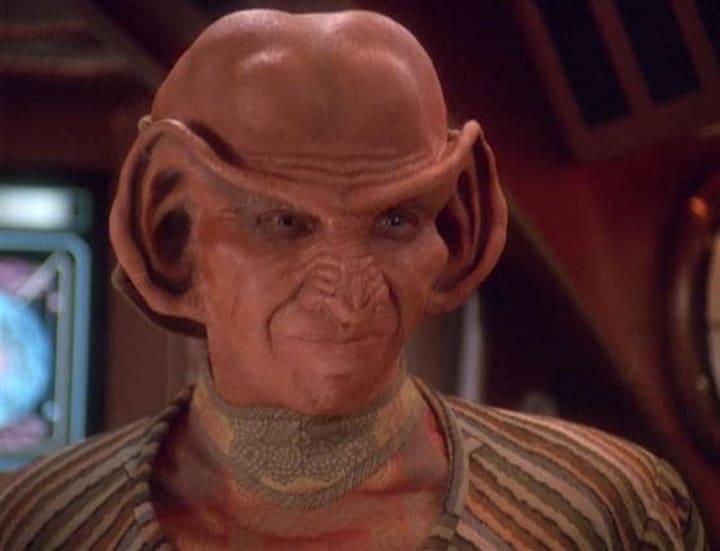
He'll make an outstanding Nagus. Ferenginar isn't a democracy yet but I'd vote for him.
So, Old Ferenginar would be capitalism gone wild, basically. And the series in which it gets the most screen time, Deep Space Nine, doesn't hold back in cutting it down to size and showing how ugly it can get. Socialist Starfleet looks pretty awesome in comparison, and Ferenginar’s layer upon layer of monetary issues are deep and kind of mind-boggling. It makes you wonder what they’d be like if they’d never even heard of the stuff.
You’d get somebody like him.
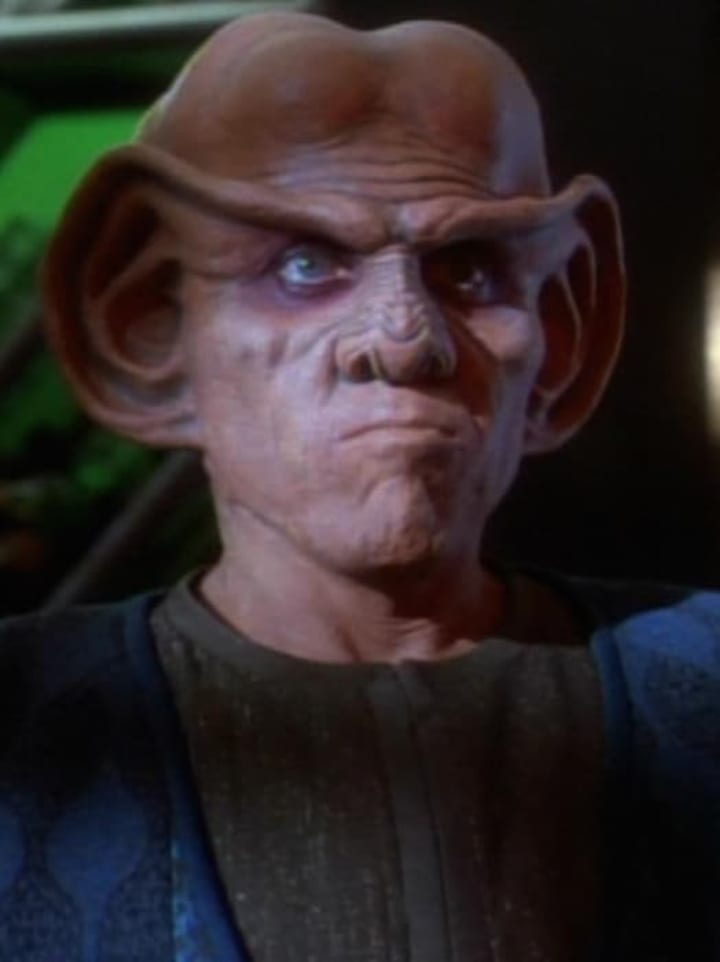
Mirror Quark, we barely knew ye.
The Alternate 'Mirror' Universe: What is currency, anyway?
The Alternate Universe in is a rough place. You might remember it as the "Mirror" universe from The Original Series where everyone was super mean and #Spock had that gnarly beard. Well, in #DS9, Terrans - that’s us, Earthlings - are basically lower than dirt, and the Bajorans, Cardassians and Klingons have formed an evil Alliance to keep us under their boots.
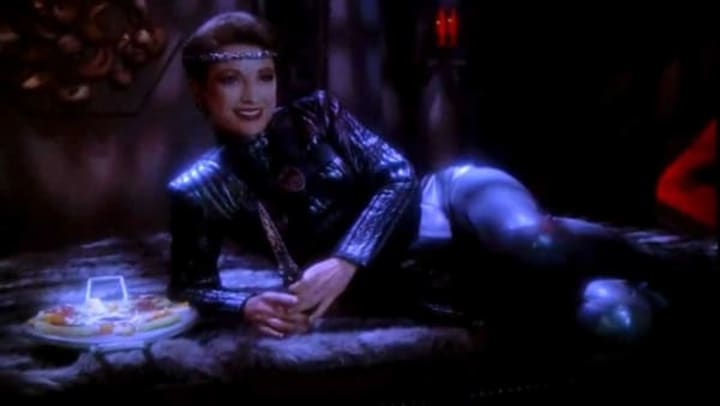
Their sexy leather boots. Sorry, I had to. Dang, Mirror Kira.
You could spend a while just looking at that fascinating, scary universe alone - everything’s different, but that doesn’t mean it’s evil. In fact, Quark’s alt-universe version dedicates his life to smuggling battered and abused humans out of this terrible place… and doesn’t expect a single drop of Latinum in return. That’s because, before the above Intendant Kira has him brutally arrested and executed, we learn that he’s never heard of it. This Ferenginar has no discernible form of currency. And it makes an incredible difference. The Ferengi in the Alternate Universe are good, brave, self-sacrificing people just trying to survive in this nightmare world.
But the Alliance of the Mirror Universe aren't the only bad guys who pose a threat to truth, justice, and the Federation decency we know and love. There’s enough good-versus-evil in Star Trek’s main universe alone, and DS9’s finale is a climactic battle for the entire Alpha Quadrant. At the heart is a revolution on Cardassia, old enemy of Bajor and the Federation, and draconian dictatorship, that ushers in a new age of… democracy.
'Deep Space Nine': order from chaos and the never-ending sacrifice.
The Borg are an army. The Dominion had several. Ruled by the Founders, the Dominion was made of the diplomatic-but-cruel Vorta, the intensely loyal Jem’Hadar shock troops, and anyone else the Dominion could buy, threaten, or bulldoze into submission. Like Cardassia.
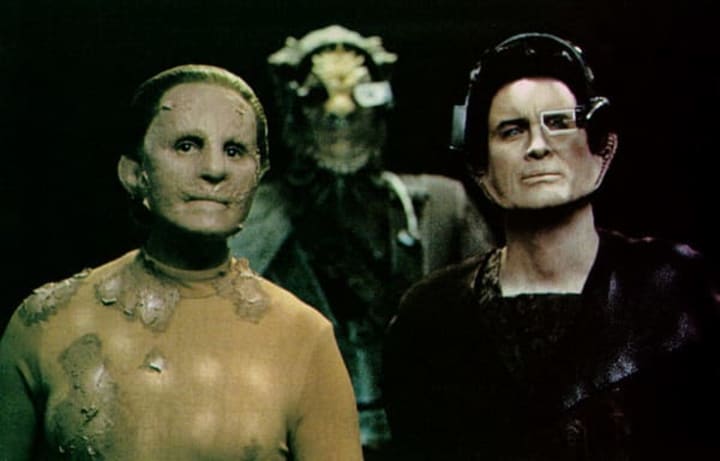
Hi. We're the Dominion. Resistance would be... unwise.
And unlike the Borg, the Dominion really didn't care about assimilation. If you put up a fight, they'll straight-up blast you out of the sky. Their ultimate goal is order. This galaxy is a chaotic, filthy, unacceptably messy place, and the Founders simply must control it. By taking over every single planet with intelligent life, and eradicating resistance. That’s about the single most authoritarian modus operandi we’ve seen in all of Star Trek. You could make a solid case that they’re even more fascist than the Borg - particularly when you consider the fact that the Founders have literally genetically engineered the Vorta and Jem’Hadar to worship them as deities. The Borg Queen simply wants obedience. The Founders want adulation.
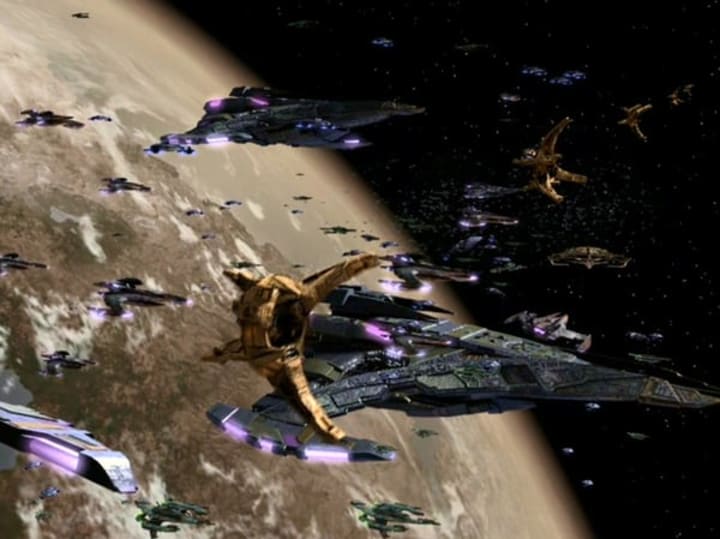
Oh crap. They have ships. A lot of ships. (The purple ones are bad.)
At first, this lines up pretty well with uber-totalitarian Cardassia. The show opens with Bajor - the planet DS9 orbits - recovering from 50 years of ferocious and bloody Cardassian occupation in a clear WWII parallel. No points for guessing who the Cardassians symbolize here.
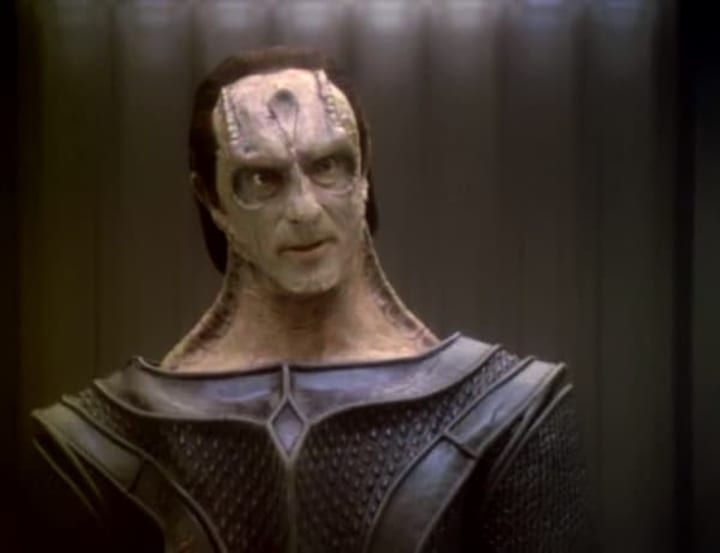
Or who this guy’s supposed to be.
All that aside, this world was once essentially an Orwellian dystopia, treating its own citizens with suspicion, cruel restrictions, and draconian punishments. (“You’re under arrest. You’ll be executed at dawn, trial to begin at midnight. You’ll be informed of the verdict shortly beforehand.” - the Cardassian ‘justice’ system, in summary.) When the ruthless Gul Dukat, DS9’s primary antagonist until this point, joins the Dominion’s ranks, they don’t seem like the strangest of bedfellows. His mistake lies in thinking anyone could ever have a voice or say in the Dominion’s operations but the Founders, just as he’d never share power with anyone else. They’re too much alike.
And just like Ferenginar, Cardassia learns hard and fast that if it stands a chance for survival, it has to change. The same militaristic world that once cruelly occupied Bajor finds itself at the mercy of an even bigger, crueler, more draconian enemy, and they’re forced to ask the Federation for help. (How’s that for governmental commentary?)
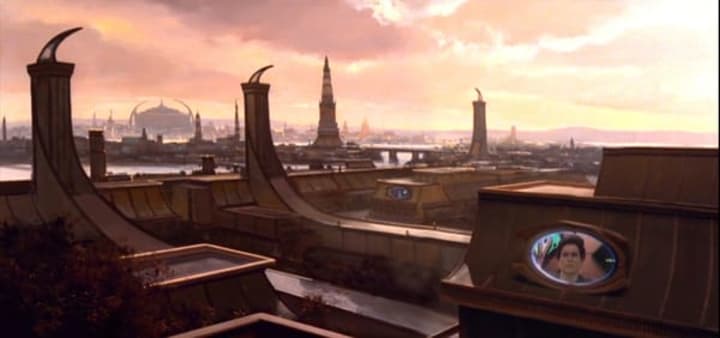
Seriously, not big-screen broadcasting the Vorta would be a good step.
The end of the series sees the Cardassian people rise up and overthrow their own oppressive government and the Dominion. The death toll is in the millions and the planet is devastated, but it's on the path for an eventual reconstruction in a more democratic image. A much kinder, gentler one, by all accounts - though considering their starting point, it’d be hard to get much worse. So maybe Star Trek is more of a pro-democratic, cautionary tale after all. Or maybe it’s just this series. Or…
So, is Star Trek communist? Well… is the world in general?
A human, a vulcan, a klingon, a bajoran, and a ferengi walk into a bar. (It's Quark's. Where else?)
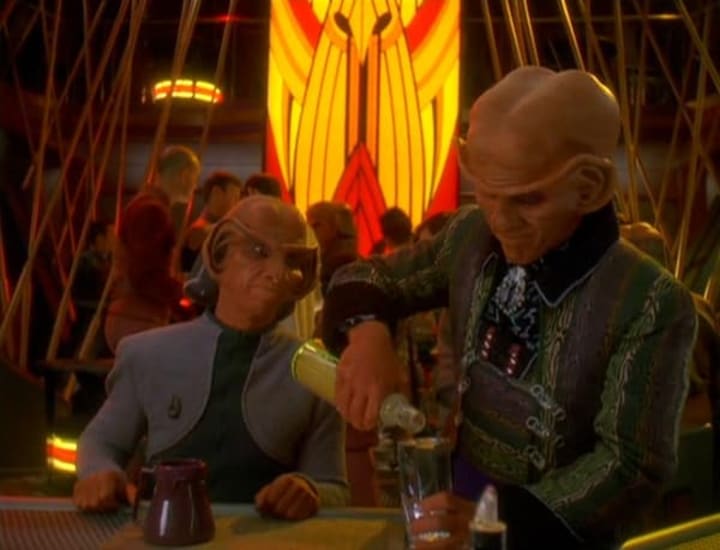
Sometimes you just wanna go where everybody knows your name.
Now, ask them that question - Is Star Trek communist? Or any other question. Anything at all. And you'll get five different answers.
Heck, get five humans in a room...
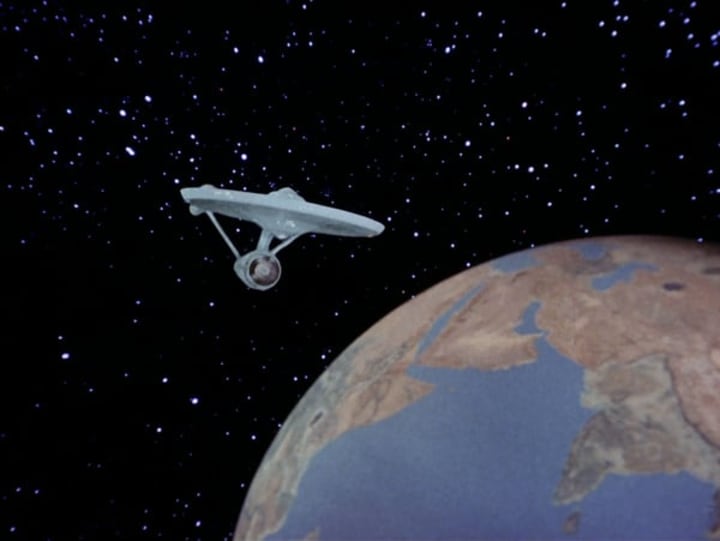
I hope the 24th century is better than 2016. I really do.
We don't all live on Earth, and neither does our story. Sometimes, worlds collide. When they do, that's when things really get interesting. And that's another huge component of Star Trek: finding our place in a wide open universe, exploring the galaxy and seeing some of the other people who live in it. Even if we don't always agree.
One of the pillars on which Star Trek is based is a huge, incredible galaxy filled with wonders. "Infinite diversity in infinite combinations." The series are as different as some of the planets in this amazing galaxy, and the people living on them.
Within the Federation itself, there's variety. Outside it, even more. New life, new civilizations. That's kind of the point here. We're supposed to seek them out. Boldly go. Ask 'em our questions, and get some answers, be part of their worlds - sorry. Wrong seminal pop-culture franchise.
So, is it communist?
Yes and no. The answer is individual. And communal. It's one and millions. Infinite variety, infinite combinations.
I don't know, friends, just watch some Star Trek and tell me what you think. Whatever answer you reach, you'll have fun getting there.
About the Creator
RoAnna Sylver
Writes weird books about marginalized people surviving/rocking out (CHAMELEON MOON, STAKE SAUCE), amazing puns, and geeky articles. Lives with chronic pain/genetic weirdness. An actual mutant. Open Your Eyes, Look Up To The Skies And See!




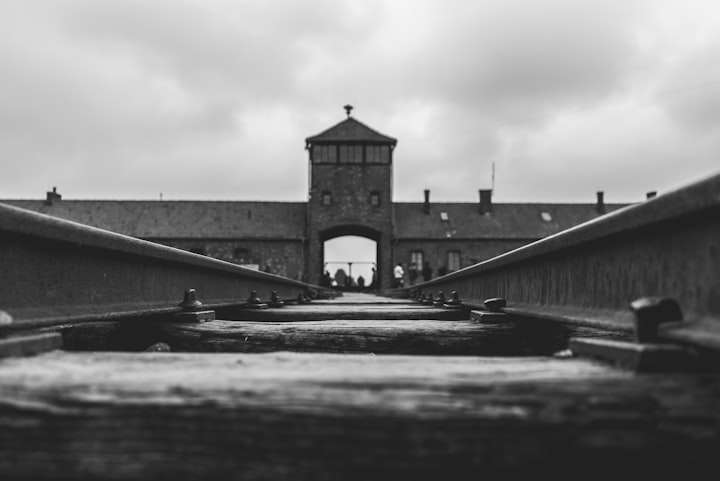

Comments
There are no comments for this story
Be the first to respond and start the conversation.